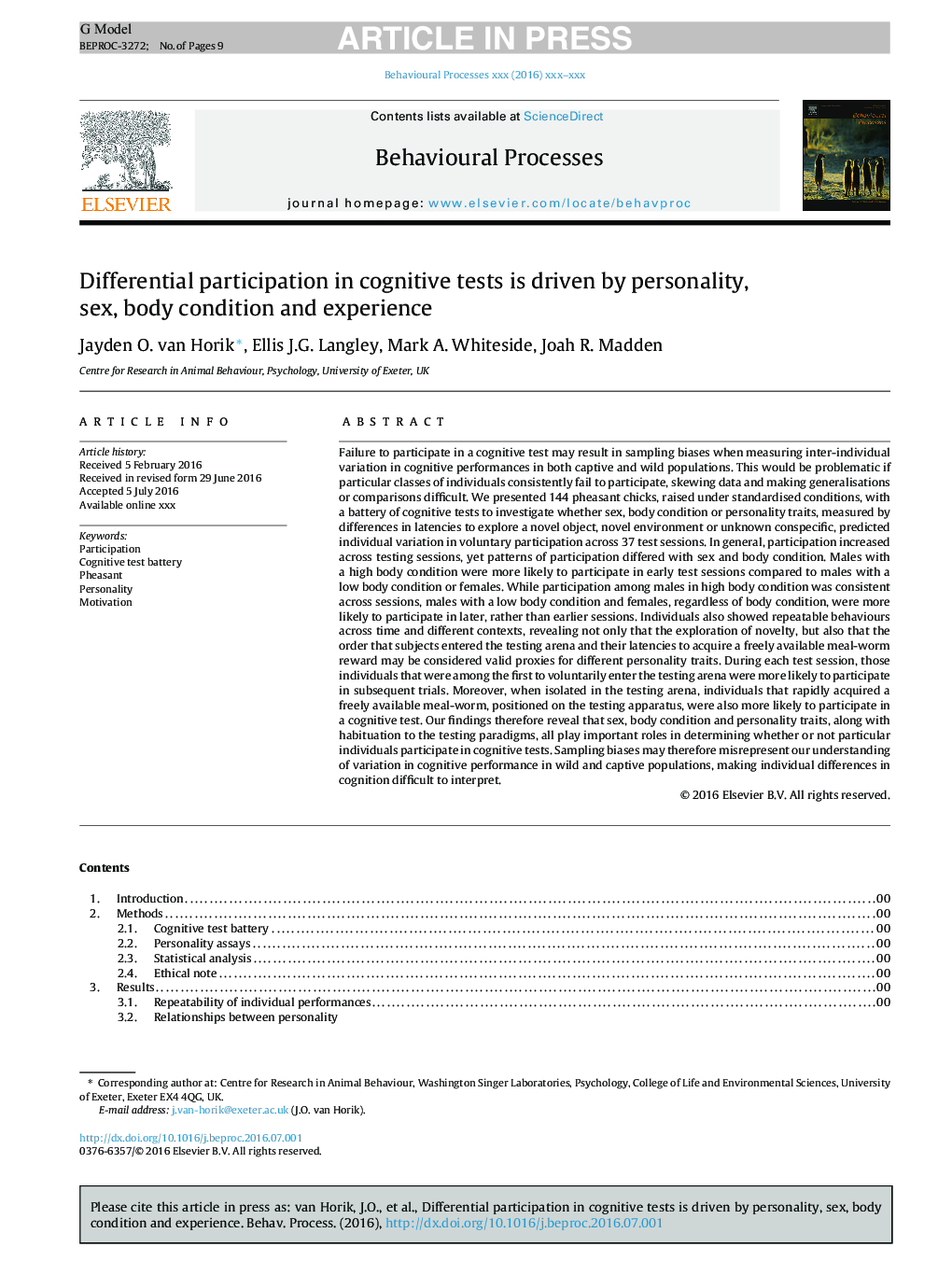| کد مقاله | کد نشریه | سال انتشار | مقاله انگلیسی | نسخه تمام متن |
|---|---|---|---|---|
| 5539813 | 1553146 | 2017 | 9 صفحه PDF | دانلود رایگان |
عنوان انگلیسی مقاله ISI
Differential participation in cognitive tests is driven by personality, sex, body condition and experience
ترجمه فارسی عنوان
مشارکت دیفرانسیل در تست های شناختی بر اساس شخصیت، جنس، وضعیت بدن و تجربه است
دانلود مقاله + سفارش ترجمه
دانلود مقاله ISI انگلیسی
رایگان برای ایرانیان
کلمات کلیدی
مشارکت، باتری تست شناختی، قرقاول، شخصیت، انگیزه،
ترجمه چکیده
عدم مشارکت در یک آزمون شناختی ممکن است منجر به برداشت های نمونه گیری در هنگام اندازه گیری تغییرات بین فردی در عملکرد شناختی در هر دو گروه اسیر و وحشی شود. این امر مشکل خواهد بود اگر طبقات خاصی از افراد به طور مداوم به مشارکت نرسند، داده ها را خراب کنند و تعاریف و مقایسه ها دشوار باشد. ما 144 جوجه فازاز را مطرح کردیم که تحت شرایط استاندارد قرار گرفت و با استفاده از آزمایشات شناختی برای بررسی اینکه آیا جنسیت، وضعیت بدنی یا ویژگی شخصیتی، با اندازه گیری اختلاف در زمان تأخیر برای کشف یک شیء جدید، محیط جدید یا تغییرات ناشناخته، مشارکت در 37 جلسه آزمون به طور کلی، مشارکت در جلسات آزمایش افزایش یافت، با این حال الگوهای مشارکت با جنس و وضعیت بدن متفاوت بود. مردان با شرایط بدنی بالا بیشتر در جلسات تست زودهنگام شرکت کردند در مقایسه با مردان با شرایط بدنی کم یا زنان. در حالی که مشارکت مردان در شرایط بدن در طول جلسات، در تمام جلسات سازگار بود، مردان نسبت به وضعیت بدنی و زنان، صرف نظر از وضعیت بدن، احتمال بیشتری نسبت به جلسات قبلی داشتند. افراد همچنین رفتارهای تکراری را در طول زمان و زمینه های مختلف نشان دادند، نه تنها نشان می داد که کشف جدیدیت، بلکه این که نظم که افراد وارد عرصه تست و تأخیر آنها برای به دست آوردن پاداش کرمی آزادانه در دسترس هستند ممکن است پراکسی های معتبر برای مختلف صفات شخصیتی در طی هر جلسه آزمون، کسانی که در میان اولین کسانی بودند که به طور داوطلبانه به عرصه تست وارد شدند احتمال بیشتری در دادگاه های بعدی شرکت کردند. علاوه بر این، هنگامی که در عرصه تست جدا شد، افرادی که به سرعت در معرض کرم خوراکی آزاد قرار گرفتند، در دستگاه تست قرار داشتند، احتمال بیشتری برای شرکت در آزمون شناختی نیز داشتند. یافته های ما نشان می دهد که جنس، وضعیت بدنی و ویژگی های شخصیت، همراه با عادت به پارادایم های تست، نقش مهمی در تعیین اینکه آیا افراد خاص در آزمون های شناختی شرکت می کنند یا خیر، اهمیت دارد. بنابراین، اشتباهات نمونه گیری ممکن است درک ما از تغییر در عملکرد شناختی در جمعیت های وحشی و اسیر غلط باشد، و تفاوت های فردی در شناخت را دشوار می کند.
موضوعات مرتبط
علوم زیستی و بیوفناوری
علوم کشاورزی و بیولوژیک
علوم دامی و جانورشناسی
چکیده انگلیسی
Failure to participate in a cognitive test may result in sampling biases when measuring inter-individual variation in cognitive performances in both captive and wild populations. This would be problematic if particular classes of individuals consistently fail to participate, skewing data and making generalisations or comparisons difficult. We presented 144 pheasant chicks, raised under standardised conditions, with a battery of cognitive tests to investigate whether sex, body condition or personality traits, measured by differences in latencies to explore a novel object, novel environment or unknown conspecific, predicted individual variation in voluntary participation across 37 test sessions. In general, participation increased across testing sessions, yet patterns of participation differed with sex and body condition. Males with a high body condition were more likely to participate in early test sessions compared to males with a low body condition or females. While participation among males in high body condition was consistent across sessions, males with a low body condition and females, regardless of body condition, were more likely to participate in later, rather than earlier sessions. Individuals also showed repeatable behaviours across time and different contexts, revealing not only that the exploration of novelty, but also that the order that subjects entered the testing arena and their latencies to acquire a freely available meal-worm reward may be considered valid proxies for different personality traits. During each test session, those individuals that were among the first to voluntarily enter the testing arena were more likely to participate in subsequent trials. Moreover, when isolated in the testing arena, individuals that rapidly acquired a freely available meal-worm, positioned on the testing apparatus, were also more likely to participate in a cognitive test. Our findings therefore reveal that sex, body condition and personality traits, along with habituation to the testing paradigms, all play important roles in determining whether or not particular individuals participate in cognitive tests. Sampling biases may therefore misrepresent our understanding of variation in cognitive performance in wild and captive populations, making individual differences in cognition difficult to interpret.
ناشر
Database: Elsevier - ScienceDirect (ساینس دایرکت)
Journal: Behavioural Processes - Volume 134, January 2017, Pages 22-30
Journal: Behavioural Processes - Volume 134, January 2017, Pages 22-30
نویسندگان
Jayden O. van Horik, Ellis J.G. Langley, Mark A. Whiteside, Joah R. Madden,
